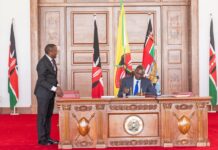The East Africa Law Society (EALS) has strongly condemned the alleged abduction, torture, and illegal cross-border rendition of Kenyan human rights defender Mr. Mwabili Mwagodi in the United Republic of Tanzania, calling it a grave violation of both regional and international law and a dangerous erosion of civic freedoms across East Africa.
In a detailed statement issued from Arusha on July 29, 2025, EALS accused Tanzanian authorities of orchestrating a brutal and unlawful operation targeting Mr. Mwagodi, an activist known for challenging exploitative religious fundraising practices in Kenya. According to the Society, Mr. Mwagodi was abducted in Tanzania on Wednesday, July 23, and held incommunicado for several days in breach of both Tanzanian and international legal norms.
While in custody, Mr. Mwagodi was reportedly subjected to physical abuse, including beatings and having his head stepped on while remaining handcuffed day and night. The East Africa Law Society also reported visible syringe marks on his body, suggesting that he may have been injected with unknown substances.
Attempts by Mr. Mwagodi’s employer to file a missing person report were initially rejected by local police, who enforced a 24-hour waiting period before launching an investigation. The delay, the Society noted, represents a failure to act with urgency in a life-threatening situation.
The incident, while alarming in its own right, is not isolated. The EALS drew parallels with the recent abductions and illegal expulsions of Kenyan journalist and activist Boniface Mwangi and Ugandan civic leader Agather Atuhaire. Both were seized while attending the public trial of Tanzanian opposition figure Tundu Lissu and later dumped at the Kenya-Tanzania and Uganda-Tanzania borders, respectively. These cases are now the subject of an ongoing legal challenge filed jointly by the EALS and partner organizations before the East African Court of Justice.
“These events signal a disturbing pattern of coordinated regional repression designed to intimidate and silence civic actors who lawfully express dissent and demand accountability,” said the EALS statement.
The Society outlined multiple legal breaches:
- Tanzanian Law: The country’s constitution guarantees liberty, prompt notification upon arrest, and access to legal counsel. Tanzanian criminal procedure requires individuals arrested without a warrant to be brought before a court within 24 hours—requirements reportedly flouted in Mr. Mwagodi’s case.
- EAC Treaty Obligations: Articles 6(d) and 7(2) of the East African Community Treaty compel Partner States to uphold human rights and the rule of law. The cross-border rendition of civic activists undermines regional integration and civic participation.
- International Human Rights Norms: Tanzania’s actions contravene Article 6 of the African Charter on Human and Peoples’ Rights, which prohibits arbitrary detention, and Articles 7 and 9 of the International Covenant on Civil and Political Rights (ICCPR), which ban torture and enforced disappearance.
In response, the East Africa Law Society issued four key demands:
- Independent Investigation: A transparent and impartial probe into the abduction and mistreatment of Mr. Mwagodi, with findings made public and perpetrators held accountable.
- Adherence to Legal Standards: Strict observance of due process, including prohibiting incommunicado detention and respecting limits on pretrial detention.
- End to Cross-Border Persecution: Immediate cessation of the intimidation and expulsion of civic actors from neighboring EAC countries.
- International Oversight: Urgent intervention by the EAC Secretariat, the African Commission on Human and Peoples’ Rights, and the UN Special Rapporteur on Human Rights Defenders to investigate and monitor Tanzania’s treatment of regional activists.
“The abduction of a peaceful activist is not just a legal crisis, it is a moral reckoning,” said EALS President Ramadhan M. Abubakar. “Silencing voices of conscience weakens democracy, undermines unity, and damages the reputation of nations. We will not be silent.”
The Society also lamented that these recent actions betray Tanzania’s historical legacy as a haven for liberation movements and political exiles. “The country that once welcomed the oppressed now appears to be silencing truth-tellers,” the statement added.
Founded in 1995 and headquartered in Arusha, the EALS is the umbrella body for bar associations across East Africa, including the Law Society of Kenya, Tanganyika Law Society, Uganda Law Society, Rwanda Bar Association, and others. It holds Observer Status at both the East African Community and the African Commission on Human and Peoples’ Rights and plays a central role in regional legal development and advocacy.
The EALS reaffirmed its solidarity with Mr. Mwagodi and all defenders of civic space in East Africa, urging all EAC Partner States to recommit to the protection of human rights, justice, and democratic governance.
Written By Rodney Mbua



















